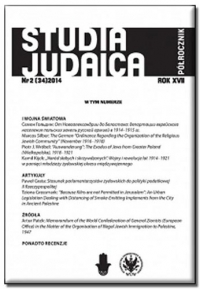The Last auto-da-fé in Europe? The Case of the Jewish Merchant Boroch Leibov and Captain-Lieutenant Aleksander Voznitsyn and Its Consequences
The Last auto-da-fé in Europe? The Case of the Jewish Merchant Boroch Leibov and Captain-Lieutenant Aleksander Voznitsyn and Its Consequences
Author(s): Maciej SzkółkaSubject(s): Social history, History of Judaism
Published by: Wydawnictwo Uniwersytetu Jagiellońskiego
Keywords: trial; burn; Russian Empire; Judaism
Summary/Abstract: An unprecedented event took place in the Russian Empire in the second half of 1738. On the main square of St. Petersburg, a Jewish merchant, Boroch Leibov, and a Russian navy captain-lieutenant, Aleksander Voznitsyn, were burned alive at the stake. Voznitsyn had met Leibov while staying in Moscow. Impressed by the teachings of his new acquaintance, he decided to convert to Judaism. The reason for this decision was probably the mental illness of the captain or his unconfirmed family ties with the fifteenth-century Heresy of the Judaizers. Based on the Sobornoye Ulozheniye decree, both of them were sentenced to public burning for withdrawal from the Orthodox faith and blasphemy, in the case of Voznitsyn, and for persuading an Orthodox man to withdraw from his faith, in the case of Leibov. The trial of Boroch and Voznitsyn was widely reported in the whole Russian Empire and became the cause of rapid changes in the policy toward the Jews. Both Empress Anna Ivanovna and, after 1740, her successor, Elizabeth Petrovna, signed a number of decrees ordering the Jews to leave the borders of the Russian Empire.
Journal: Studia Judaica
- Issue Year: 20/2017
- Issue No: Special
- Page Range: 71-84
- Page Count: 14
- Language: English

